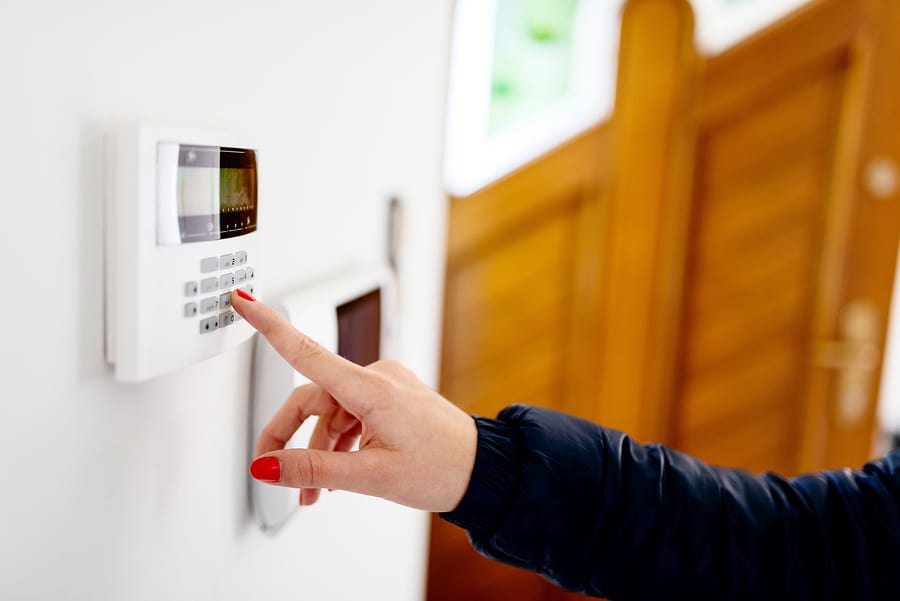Have you ever heard your home alarm blaring in the middle of the night, only to realize the battery had run out? I’ve been there too. It got me thinking, “Can a house alarm work without a battery?”
We all rely on batteries to keep our home alarms working, but what happens if the battery dies or is missing?
No, a house alarm typically won’t work without a battery. Batteries provide a vital power source for the alarm system to function, ensuring it can alert you to potential security threats, even in case of a power outage.
While there are alternative power sources like hardwiring or solar panels, these systems often include battery backups to maintain operation when the primary power source fails. So, in most cases, a functioning battery is essential for your house alarm to work effectively.
The Role of Batteries in House Alarms

House alarms are a crucial component of home security, providing protection against intruders and emergencies.
First and foremost, house alarms are typically powered by electricity, but they also rely on batteries as a backup power source. Batteries serve a critical role in ensuring that the alarm system continues to function even when there’s a power outage. This backup power source is essential to maintain the alarm’s effectiveness and reliability.
In the event of a power failure, the battery takes over to keep the alarm operational. This means that your home remains protected, and the alarm can continue to trigger alerts or notifications in case of an emergency. Without a battery backup, a power outage could render your alarm system useless, leaving your home vulnerable.
Additionally, batteries in house alarms are designed to provide extended backup power, typically lasting for several hours or even days, depending on the system. This extended power supply is crucial to cover prolonged power outages, ensuring that your home remains secure and protected.
Also, house alarms with battery backups also offer protection against tampering. Intruders may attempt to disable an alarm system by cutting power lines. However, with a functional battery backup, the alarm remains active, making it difficult for unauthorized individuals to compromise your security.
What Are The Consequences Of A Dead Battery
When it comes to house alarms, a dead battery can have serious repercussions, potentially compromising your home’s security and leaving you vulnerable to various risks.
One of the immediate consequences of a dead battery in a house alarm is the loss of power backup. In the event of a power outage, which can occur due to various reasons, including storms or technical issues, the alarm system relies on its battery to keep functioning. Without a functioning battery, your alarm won’t be able to provide the much-needed backup power, leaving your home unprotected during these crucial moments.
A dead battery makes your home more vulnerable to intruders and security threats. Burglars and trespassers may take advantage of the alarm’s inability to sound warnings or trigger alerts. This increased vulnerability could lead to potential break-ins and thefts, putting your property and loved ones at risk.
Modern house alarms are often connected to monitoring services or smartphone apps that provide real-time notifications in case of security breaches or emergencies. With a dead battery, these notifications may not reach you, leaving you unaware of critical events in and around your home. This lack of notification can delay your response to emergencies, affecting your ability to take immediate action.
In emergencies like fires or medical crises, a functional house alarm can be a lifesaver. It can alert you and emergency services promptly. However, a dead battery can compromise this safety net, delaying response times and potentially worsening the outcome of such situations.
Lastly, a dead battery can result in potential damage to your property. For example, in the case of a fire, a working alarm can alert you and the fire department early, reducing the extent of damage. Without a functioning alarm, the fire could spread unchecked, resulting in more significant property damage and higher repair costs.
In summary, the consequences of a dead battery in a house alarm are far-reaching. They include loss of power backup, increased vulnerability to security threats, lack of notification, compromised safety, and potential property damage.
Battery-Powered vs. Hardwired Alarms
When it comes to house alarms, choosing the right type of system is crucial for your home’s security. One fundamental decision you’ll need to make is whether to opt for a battery-powered alarm or a hardwired one.
| Feature | Battery-Powered Alarms | Hardwired Alarms |
| Power Source | Reliant on batteries for primary power. | Connected to the house’s electrical system. |
| Installation | Easy DIY installation, suitable for homeowners and renters. | Professional installation often required due to wiring. |
| Portability | Easily moved or repositioned due to wireless design. | Fixed in place once installed, limited portability. |
| Reliability | Continuous protection unless batteries fail. | Reliable, uninterrupted protection with power supply. |
| Power Outages | Not affected by power outages, provided batteries are functional. | May rely on backup batteries during power outages. |
| Maintenance | Requires regular battery checks and replacements. | Minimal maintenance but backup battery checks are essential. |
| Cost | Typically more affordable upfront cost. $20 to $100 per unit. | Higher upfront installation cost, lower ongoing maintenance. $50 to $200 per unit. |
| Durability | Battery life can affect long-term reliability. | Dependable, with potential battery backup. |
| Security Features | Varied security features available, depending on the model. | Often integrated with advanced security systems. |
| Customization Options | Offers flexibility for customization and expansion. | May have more advanced customization options. |
How Long Does a Battery Last in a House Alarm?
The lifespan of a battery in a house alarm system can vary significantly depending on several factors. House alarm systems typically rely on batteries to ensure uninterrupted functionality, especially during power outages.
First, the type of battery used in your house alarm system plays a crucial role in determining its lifespan. Common battery types include
- Lead-Acid Batteries: These are durable and can last anywhere from 3 to 5 years or more with proper maintenance.
- Lithium Batteries: Lithium batteries have a longer lifespan, typically lasting between 5 to 7 years or even more in some cases.
- Alkaline Batteries: Alkaline batteries are less common in house alarms due to their shorter lifespan, usually around 1 to 2 years.
The frequency of alarm system usage affects battery life. If your alarm frequently triggers due to various factors like pets, moving objects, or environmental conditions, it may drain the battery faster.
The efficiency of your alarm system also matters. Modern, energy-efficient systems tend to prolong battery life compared to older models.
If your area experiences frequent power outages, the battery in your alarm system will be used more frequently, potentially shortening its lifespan.
The capacity of the battery, usually measured in ampere-hours (Ah), determines how long it can power your alarm during an outage. Higher-capacity batteries can last longer.
Regular maintenance, including testing the battery and ensuring it’s properly charged, can extend its lifespan. Neglecting maintenance can lead to premature battery failure.
Most modern alarm systems provide low-battery warnings well in advance. Replacing the battery promptly when you receive these warnings can prevent system downtime.
In summary, the lifespan of a battery in a house alarm system can vary from 1 to 7 years or more, depending on factors like battery type, usage patterns, system efficiency, power outages, battery capacity, maintenance, and responsiveness to low-battery warnings. To ensure your alarm system remains reliable, it’s essential to monitor your battery’s condition and replace it when needed.
What To Do if the Alarm System Battery Dies

First and foremost, it’s essential to stay calm and composed when you realize that the alarm system battery has died. A dead battery doesn’t necessarily translate to an immediate security breach.
The next crucial step is to confirm that the battery is, indeed, the culprit. Most modern alarm systems come equipped with low-battery warnings. Check the system’s display or refer to the user manual to see if any such indications are present.
If you’ve confirmed that the battery needs replacing, it’s time to take action. Start by turning off the alarm system to ensure safety during the battery replacement process. Next, you’ll need to purchase a new battery. It’s imperative to acquire the correct type of battery recommended by the alarm system’s manufacturer. The user manual will provide guidance on the specific battery requirements.
Replacing the battery typically involves opening the control panel or battery compartment, disconnecting the old battery, and connecting the new one following the manufacturer’s instructions. Once the new battery is in place, turn your alarm system back on and test it to ensure that it functions correctly.
To prevent future battery failures, consider establishing a regular maintenance schedule. Test your alarm system, including the battery, on a routine basis, and replace the battery when needed, even before it fully drains. This proactive approach ensures that your home’s security remains reliable.
For added peace of mind, especially if you live in an area prone to power outages, you might want to consider investing in a backup power system, such as an Uninterruptible Power Supply (UPS). These systems provide extended power backup, keeping your alarm system operational during outages.
If you’re unsure about replacing the battery or encounter any difficulties during the process, seeking professional assistance is a wise decision. Alarm system technicians can ensure that the replacement is done correctly and efficiently.
Finally, don’t forget to update your emergency contacts about the battery replacement to prevent any false alarms and ensure that everyone is informed about the changes made to the system.
FAQ
How can I silence my house alarm without power?
If your house alarm is blaring due to a power outage, you can usually silence it by entering your security code on the control panel. However, this may vary depending on your alarm system, so refer to your user manual for specific instructions.
Are house alarms connected to electricity?
Yes, many house alarms are connected to electricity as their primary power source. However, they often have battery backups to ensure they remain operational during power outages.
Do house alarm batteries recharge?
Some house alarm batteries recharge automatically when the power is restored after an outage. However, not all alarm systems have this feature, so it’s essential to check your system’s specifications.
Do alarm batteries recharge?
Yes, alarm batteries can recharge if your alarm system is designed with this capability. When the power is back, the battery will recharge automatically to ensure it’s ready for the next outage.
How do I check my house alarm battery?
To check your house alarm battery, refer to your user manual for specific instructions. Typically, you can access the battery compartment and inspect the battery’s condition or voltage level.
How do I know if my alarm battery is dying?
A dying alarm battery may trigger low-battery warnings on your control panel or produce intermittent beeping sounds. Some systems also provide notifications via a mobile app or email.
How do I know if my house alarm battery is low?
A low house alarm battery may result in a warning message on your control panel or audible beeping. Refer to your user manual for details on how your specific system indicates a low battery.
How long does it take for an alarm battery to recharge?
The time it takes for an alarm battery to recharge varies depending on the battery’s capacity and the system’s design. It can range from a few hours to several days.
How do alarm batteries work?
Alarm batteries provide backup power to the alarm system when the primary power source (electricity) fails. They store energy and release it to keep the system operational during outages, ensuring your home’s security is maintained.
Final words
All things considered, a house alarm without a battery is like a car without fuel—it simply won’t work. The battery in your house alarm system is its lifeblood, providing power during outages and ensuring your security.
While some hardwired systems may have a backup power source, it’s essential to maintain and replace your alarm’s battery as needed. By doing so, you can rest assured that your house alarm will continue to safeguard your home and loved ones, providing you with peace of mind.
So remember, when it comes to your home’s security, keeping that battery fresh and functional is the key to a reliable alarm system.











